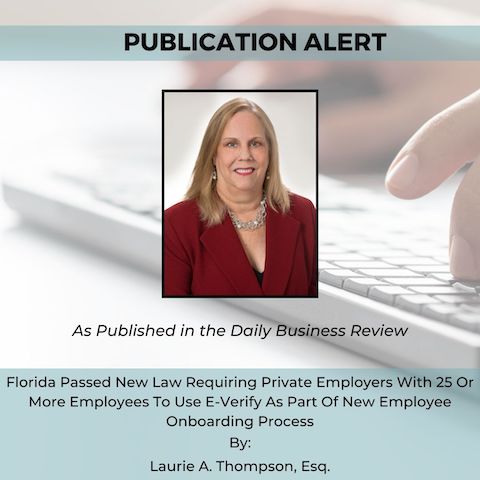
By: Laurie A. Thompson
As Published in the Daily Business Review
On May 10, 2023, Governor DeSantis signed SB 1718, which, among other things, expands the requirement to use E-Verify as part of the onboarding process for new hires to all private employers with 25 or more employees. Florida previously limited its requirement of E-Verify to public employers and contractors beginning on January 1, 2021. The new law's effective date is July 1, 2023.
E-Verify is a digital verification tool used to determine employment eligibility by comparing an employee's information (such as name, social security number, address and date of birth) with records held by the Social Security Administration and the Department of Homeland Security. As a result of the new law, covered employers will now be required to verify the employment eligibility for all new hires within three business days after the new hire begins working for pay by completing the Form I-9 and utilizing the E-Verify system. If the information provided by the employee does not match with what is in the E-Verify system, the employer will be notified with a Tentative Non-confirmation ("TNC") result. In such a situation the employer must give the TNC notice to the employee, who then has 10 days from the issuance of the TNC to notify the employer whether they have resolved the issue. If the employee cannot resolve the issue, they are no longer eligible to continue employment. It is important to note that "employee" is defined as an individual filling a permanent position under the control of employer. Therefore independent contractors and casual laborers are not considered employees and would not be covered by the new law.
The employer must retain a copy of the documentation as well as any official verification generated for at least three years. Additionally, each employer that is required to use the E-Verify system must certify on its first return each calendar year to the tax service provider, that it is in compliance with this section when making contributions to, or reimbursing the state’s unemployment compensation or reemployment assistance system. An employer that voluntarily uses the E-Verify system, i.e., those private employers with less than 25 employees may also make such a certification on its first return each calendar year in order to document such use.
Beginning after July 1, 2024, if the Department of Economic Opportunity ("DOE") determines that an employer has failed to correctly use the E-Verify system significant consequences will result. In such a circumstance, the DOE must notify the employer of its determination of non-compliance and give the employer 30 days to cure the non-compliance. If an employer is determined to be non-compliant 3 times within a twenty-four month period, the DOE must impose a fine in the amount of $1,000 a day until proof is submitted that non-compliance has been cured. Non-compliance can also result in the suspension or even in some cases revocation of licenses required by the employer.
The law uses the carrot and stick approach to encourage the use of E-Verify. On the one hand, the law increases penalties for an employer who is required to and fails to use the E-Verify including large daily fines, the possible suspension or revocation of any required licenses, and possible required repayment of economic development incentive funds. On the other hand, the new law encourages the expansion of the use of E-Verify by those employers who are not yet required to use it by giving an employer who uses the E-Verify system in good faith a rebuttable presumption against a finding that it violated the law by knowingly hiring unauthorized workers.
While this is not the first time Florida has passed a law requiring certain employers to use E-Verify, this law does significantly expand the requirement for its use for private sector employers which is a trend that will likely continue. Given the potential for hiring undocumented workers in Florida and the increasing penalties and enforcement relating to this issue even those employers who are not yet required to use E-Verify would be wise to begin using it to obtain the benefit of the rebuttable presumption that they did not knowingly hire unauthorized workers.
Laurie A. Thompson is a Shareholder in the Labor & Employment and Commercial Litigation Practice Groups at Fowler White where she represents employers on a full range of employment-related matters and disputes, including FLSA violations, enforcement of non-compete agreements, human resources policies and procedures, workplace privacy and social media issues, compliance with statutory and regulatory requirements, internal investigations, compliance, and litigation avoidance strategies. Laurie can be reached at lthompson@fowler-white.com.